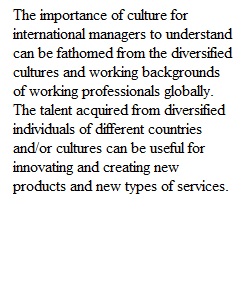


Q Here is discussion on Culture and Management. As I said before, no one likes to waste time to read a repetitive message. Please pay special attention to it this time. You do not need to answer all the questions, and particularly, you do not have to post something if you have nothing new to say. You will need to utilize knowledge from the textbook and the materials provided, and integrate them into your answer. Research-based or fact-based postings are welcome and encouraged. It is the way to provide interesting, insightful, solid, and thought-provoking discussions. Choose ONE out of the following three questions to respond. To reduce redundancy, please focus your answer to a specific question. Use the “Reply” function under the chosen question to post your discussion. Again, I encourage you to draft your answer in a word processing program first, edit it, then copy and paste it onto the DB. Q1. Why is the culture important that international managers understand it? Use your personal experiences/observations, if there’s any, as example. Q2. Describe the individual/collective dimension. What are the managerial implications of this dimension? Q3. Describe the power distance dimension. What are the managerial implications of this dimension? Q4. Describe the Masculinity/Femininity dimension. What are the managerial implications of this dimension? Q5. Describe the Uncertainty Avoidance dimension. What are the managerial implications of this dimension? Q6. Describe Long Term orientation. What are the managerial implications of this dimension? Q7. Discuss collectivism as it applies to the Chinese workplace. What managerial functions does it affect? This discussion will be closed by the end of this week.
View Related Questions